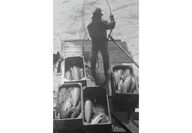Sorted by date Results 1 - 7 of 7

SEATTLE - The U.S. government has acknowledged, for the first time, the harmful role it has played over the past century in building and operating dams in the Pacific Northwest - dams that devastated Native American tribes by inundating their villages and decimating salmon runs while bringing electricity, irrigation and jobs to nearby communities. In a new report, the Biden administration said those cultural, spiritual and economic damages continue to pain the tribes, which consider salmon part...
Tens of millions of dollars raised by a landmark climate law in Washington state will go to Native American tribes that are at risk from climate change and rising sea levels to help them move to higher ground, install solar panels, buy electric vehicles and restore wetlands, Gov. Jay Inslee announced July 16. The money — $52 million — comes from the 2021 Climate Commitment Act, which auctions off allowances for heavily polluting companies in the state to emit carbon, with the revenue invested in education, transportation and other programs. Con...
SEATTLE — The U.S. granted the Makah Indian Tribe in Washington state a long-sought waiver Thursday, June 13, that helps clear the way for the tribe’s first sanctioned whale hunts in a quarter-century. The Makah, a tribe of 1,500 people on the northwestern tip of the Olympic Peninsula, is the only Native American tribe with a treaty that specifically mentions a right to hunt whales. But it has faced more than two decades of court challenges, bureaucratic hearings and scientific review as it seeks to resume hunting for gray whales. The dec...
SEATTLE (AP) — The U.S. government said Dec. 14 it plans to spend more than $1 billion over the next decade to help recover depleted salmon populations in the Pacific Northwest, and that it will help figure out how to offset the loss of hydropower, transportation and other benefits provided by four controversial dams on the Snake River, should Congress ever agree to breach them. President Joe Biden’s administration stopped short of calling for the removal of the dams to save the fish, but Northwest tribes and conservationists who have long sou...
SEATTLE (AP) — A ruling from a federal judge in Seattle could effectively shut down commercial king salmon trolling in Southeast Alaska — a valuable industry that supports some 1,500 fishermen — after a Washington state-based conservation group challenged the harvest as a threat to endangered killer whales that eat the prized fish. The state and the Alaska Trollers Association filed a notice of appeal on May 3, the day after the judge’s decision. The state is asking for a stay of the ruling, pending the appeal. Wild Fish Conservancy, which b...
SEATTLE (AP) — People have taken many steps in recent decades to help the Pacific Northwest’s endangered killer whales, which have long suffered from starvation, pollution and the legacy of having many of their number captured for display in marine parks. They’ve breached dikes and removed dams to create wetland habitat for chinook salmon, the orcas’ most important food. They’ve limited commercial fishing to try to ensure prey for the whales. They’ve made boats slow down and keep farther away from the animals to reduce their stress and to quiet...
SEATTLE (AP) — A federal court ruling last week has thrown into doubt the future of a valuable commercial king salmon fishery in Southeast Alaska, after a conservation group challenged the government’s approval of the harvest as a threat to protected fish and the endangered killer whales that eat them. The ruling, issued Aug. 8 by U.S. District Judge Richard Jones in Seattle, said NOAA Fisheries violated the Endangered Species Act and other environmental law when it approved the troll fishery. The ruling means the federal agency will have to...